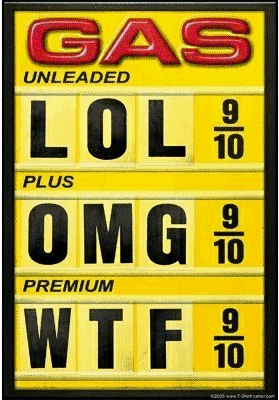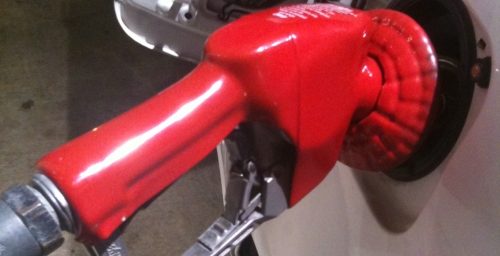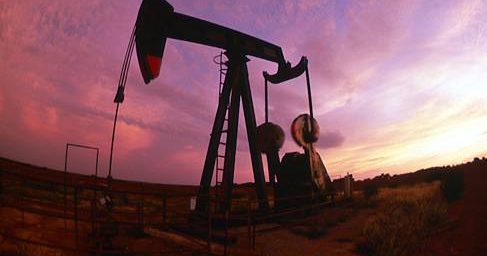High Gas Prices Our Own Fault
 George Will joins the Blame America crowd on the issue of high oil prices.
George Will joins the Blame America crowd on the issue of high oil prices.
Responding to Chuck Schumer’s suggestion that we block arms sales to Saudi Arabia until it “increases its oil production by one million barrels per day,” which would cause the price of gasoline to fall “50 cents a gallon almost immediately,” Will notes that notes that, “One million barrels is what might today be flowing from ANWR if in 1995 President Bill Clinton had not vetoed legislation to permit drilling there.” Schumer opposes drilling there even today, as do both Barack Obama and John McCain.
Will doesn’t stop there:
Also disqualified from complaining are all voters who sent to Washington senators and representatives who have voted to keep ANWR’s oil in the ground and who voted to put 85 percent of America’s offshore territory off-limits to drilling. The U.S. Minerals Management Service says that restricted area contains perhaps 86 billion barrels of oil and 420 trillion cubic feet of natural gas — 10 times as much oil and 20 times as much natural gas as Americans use in a year.
Drilling is underway 60 miles off Florida. The drilling is being done by China, in cooperation with Cuba, which is drilling closer to South Florida than U.S. companies are. [emphasis mine]
ANWR is larger than the combined areas of five states (Massachusetts, Connecticut, Rhode Island, New Jersey, Delaware), and drilling along its coastal plain would be confined to a space one-sixth the size of Washington’s Dulles airport.
He closes with this zinger:
America says to foreign producers: We prefer not to pump our oil, so please pump more of yours, thereby lowering its value, for our benefit. Let it not be said that America has no energy policy.
Of course, changing our policy this minute wouldn’t effect prices at the pump for quite some time. But decisions made 10, 20, and 30 years ago have certainly hampered our long-stated goal of “energy independence.”






FUNGIBLE. FUNGIBLE. FUNGIBLE.
Unless we abandon free trade and make sure nobody can ever sell “our oil” outside our borders, drilling our own oil is very stupid – we may need it down the road for strategic reasons.
And, also, the theory that the Saudis could just flip a switch and pump more has been pretty thoroughly discredited by the facts on the ground.
This ha sbeen my point for some time, now, James.
I note also that Terence P. Jeffrey over at CNS makes the same point, too.
Of course, now if Democrats manage to get the WH and make advances in both houses as they’re currently saying, what chance of changing his failed diection do you suppose we’ll have?
M1EK, we’ve been over this.
Even in a world market that amount of oil willcause prces to be halved, at least.
IIRC, Jeb Bush, as governor of Florida, signed a bill outlawing drilling off the coast of Florida.
I used to buy into the notion it was the environmentalists who were preventing our energy independence. But I just don’t see any incentive for big oil companies to drill for more oil or build new refineries. I think environmentalists are just tools for RW pundits and politicians to polarize the electorate, and tools for oil companies to blame for what they have no intention of doing. I think we’ve all been made chumps by politicians on both sides of the isle and the large oil companies.
Very True. Centrists…
Apparently not everyone sares that view. You did hear that we’ve got a new refinery going in in South Dakota?
I did not know about that refinery.
I found an article:
So maybe Hyperion Resources is out of the cabal’s loop. 🙂
I think you’re assumption that this is a “failed direction” is wrong.
If we can manage to get by on the amount of oil currently being pumped, while providing free-market pressures to improve efficiencies in fossil fuel use and biofuel production, as well as technologies for long-term sustainable energy, I think that is a good direction to be going in.
Grammar quibble: affect. It’d only be “effect” if gas were currently free.
Short of making China and the rest of the developing world disappear, we can do the following to lower gasoline prices: eliminate or reduce gasoline taxes, eliminate or reduce taxes on oil companies, increase oil-to-gas efficiency, increase the oil supply.
WHat Mark said.
Also, as we discossed yesterday, it’s far froma ‘free market’.
Yeah.. you’d think that’d be all over the papers, huh?
Random House:
So, policy changes affect prices, no? Conversely, prices are effected by policy changes.
Right. More drilling equals more supply, yes?
What’s the actual status of that? The only article’s I’ve managed to find say Hyperion has optioned the land, not even purchased yet, and that most aspects of the project they’re calling “Gorilla” are still a secret.
You forgot about reducing consumption.
My point has not been made invalid. Hyperion Resources is an new unknown private company that somehow happened to find a place to build a refinery. I’ve been hearing Rush Limbaugh tell me for the last 20 years that it can’t be done. The large oil companies can’t get past the environmentalists and Democrats. Go figure.
Well, Alan, if you read the link you’ll see even this wasn’t had without resistance, on the basis of NIMBY. this one got snuck in because the enviro-nazis are watching the big guns but not the smaller ones. This got by them.
But this will serve as an example of success, I tink, and resisting other developments will be harder… even for the big guys… and rightly so.
That got a big kick in the buns day before yesterday, wen the local approvaed a re-zoning to allow them in. Hyperion has announced it’s intentions to move in, and the real-estate proces are already going up in the area… there’s going to be high paying jobs there.
No matter how hard we try, there simply is not enough oil in the U.S. to achieve “energy independence”, and allowing more drilling will only postpone the inevitable: the amount of crude oil in the world is finite. We are better off pursuing more efficient ways to capture solar, wind, and geothermal energy. After decades of providing subsidies and rent seeking opportunities for oil, causing the costs of driving to be artificially low, I really don’t have a problem with government being used to push in the opposite direction.
And the fact that North Dakota/Montana may be sitting on a huge amount of untapped crude, it makes sense to start building refineries in the great white north.
So cutting us off from what we have, and what works now, makes sense?
Please.
Look; You want to find something that works better?
Fine.
Find it. If youre right, and it really does work better, I may buy into it. But don’t try to sell me that the answer to or problems runs through the land of self-imposed shortages.
I think it will by necessity have to run through the land of self-imposed shortages, the question is just when, and how much is it going to hurt when it happens.
I believe the reason for the location in this case was more for Canadian oil sands than US shale.
When you have liberals force through environmentally correct legislation which values some beast which serves us no purpose, and have been doing so for years this is the result. Rush calls it a left wing attack on our capitalist system. He is, of course, correct.
It is not an either/or argument when it comes to developing our own oil versus conservation and new technologies. At present prices all options are viable and should be underway.
It has become very obvious how much power the environmental lobby has on energy issues. For what ever reasons our elected officials fear the greens more than they care about our economic health and energy security. It’s time to launch an all out assault on the bankrupt ideas of those who oppose drilling. Until the environmentalists learn to compromise why continue to work appeasing them?
Our elected officials need to know others vote besides members of the Sierra Club and Nature Conservancy. With support they could then make the right decisions to lead us not to energy independence but simply energy security. There is a difference.
The correct way to go is to increase CAFE standards and open up an area for development. Fund new technologies and allow more coal burning. Push ethanol and build nuclear power plants. For every bone thrown to the greens throw one the other way. The list of solutions goes on and on.
It’s not so much we need government to make this all happen as it is we need government to get out of the way. The last 35 years has proven to us our government is the problem when it comes to energy policy. George Will is not joining the “Blame America crowd” but is pointing out it is the American government that deserves the blame.
You’re warm, Steve, but I need to inject here that raising CAFE standards is not getting government out of the way, it’s reinforcing the roadblock.
“After decades of providing subsidies and rent seeking opportunities for oil, causing the costs of driving to be artificially low, I really don’t have a problem with government being used to push in the opposite direction.”
How, exactly, is marking up oil so that government make AT LEAST twice as much money off of it than the people who actually produce it “causing the costs of driving to be artificially low?”
Further, I’ll remember that the next time you want to blame Bush or whoever you’re mad at next for fostering a horrible economy and costing people jobs. Energy prices affect the price of EVERYTHING and this kind of short-sighted taxation is the most regressive type possible.
You must be a facist. You WILL be silenced.
(Snort)
Wow, if only there had been about 5-7 years of republicans controlling the presidency and congress, with a war in the middle east making energy policy a big deal, they could have changed that. Yet nothing happened. Nothing at all.
Somehow it’s still all Clinton’s fault.
smurfyhoser
As much as anything else, that’s because there was only the thinnest majority or Republicans, and not nearly a majority of Conservatives.
And yes, it WAS Clinton’s fault. Because when there were enough numbers to pass it, he vetoed it.